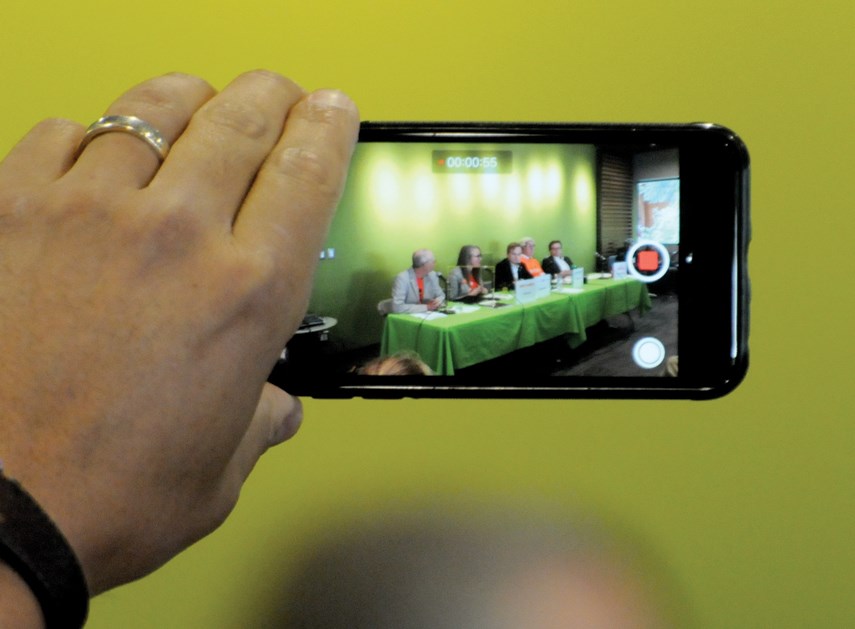Whoever forms government following the Oct. 21 federal election is going to have some financially stressed and indebted post-secondary students and graduates to deal with.
The Capilano Students’ Union organized a North Vancouver all-candidates meeting Monday to see how the parties are responding to issues important to students. Top of the list was the prohibitive cost of tuition.
NDP candidate Justine Bell said the current average undergraduate student debt load of $27,000 was unacceptable and put the blame on the governing Liberals.
“I think it’s outrageous that Justin Trudeau has made $3 billion off the back of indebted students over his term in government. When we’re talking about choices, he has chosen at that same time to forgive $6 billion in corporate loans to the richest and most powerful here in Canada,” she said.
Bell said one of the NDP’s first acts of government would be eliminating interest on federal student loans, including those still outstanding. Beyond that, Bell said her party would “work with provinces” to cap and reduce student tuition while increasing grants for students.
“Our vision is to make post-secondary part of the public education system and we consider this an investment in our future,” she said.
Conservative Andrew Saxton said he shares the belief that any Canadian who wants to go to university or college should be able to do so without cost being a barrier, but that’s what “very generous” grants, scholarships, bursaries and loan programs are for.
His party is promising to up the federal contributions to Registered Education Savings Plan accounts to 50 per cent, from the current 20 per cent on the first $2,500 or $500 max per year.
“It’s not just important for our students. It’s important for our country and our economy that we have well-educated citizens. The jobs of tomorrow will be very different from the jobs of today,” he said.
Saxton added he would also push to see more apprenticeships modelled on the ones he saw from his time living in Switzerland.
“The majority of the high school graduates in Switzerland don’t even go to university. They go to apprenticeship programs and internship programs and we need to offer Canadians this opportunity as well,” he said. “Students are happy because they’re getting paid to learn. The companies are happy because they’re getting the opportunity to give the skills necessary for their industry. And the government is happy because the private sector is doing a lot of the training.”
Green Party challenger George Orr had the sweetest offer for future students, promising a Green government would make post-secondary costs on par with elementary school and high school.
“Currently, we draw a line at the end of high school and say ‘from here on out, you pay and you sacrifice whatever income you’re going to have for the next umpteen years to pay for the education you’re going to get now,” he said. “The Green Party, if elected, will eliminate tuition fees. Period. If you’re currently carrying a student debt past a certain size, we will forgive some of that. But from here forward, the Green Party believes you are actually deserving of the education you want.”
Access to education is the best means to reducing inequality, especially for Indigenous people, Orr added.
“It draws a line across society that is unfair. It’s discriminatory. And there is no value to it. It’s just an arbitrary thing that exists because it’s always existed and it’s time for change.”
Liberal incumbent Jonathan Wilkinson defended his government’s record on education over the last four years, saying their policies have gone a long way to creating equality of opportunity. Among them listed: doubling the size of the Canada summer jobs program; increasing student grants by 50 per cent; investing $1.1 billion to reduce interest rates on student loans from five per cent down to two per cent; creating exemptions for people making less than $25,000 per year; and $330 million spent on post-secondary support for Indigenous students.
The Liberals have included in their platform pledges to increase student grants by another 40 per cent or $4,200 per year total, a two-year interest-free grace period on student loans after graduation and no requirement to make payments for anyone making less than $35,000 per year. New parents will also be cut some slack with the ability to pause loan payments when they start a family, he added.
“Taken together, these changes will make a real difference in terms of accessibility for students,” he said.
The People’s Party of Canada’s North Vancouver candidate Azmairnin Jadavji did not attend the debate.



